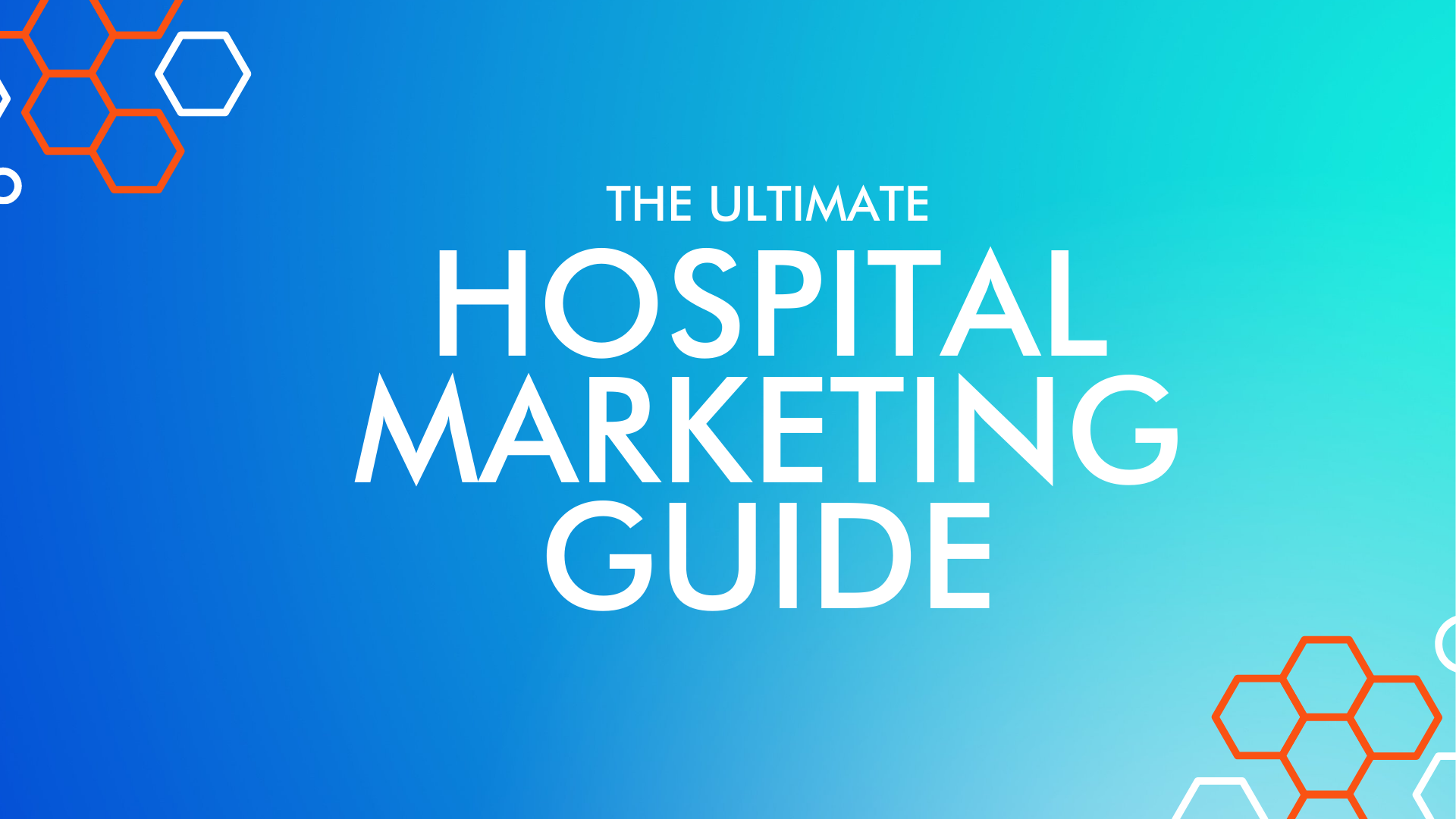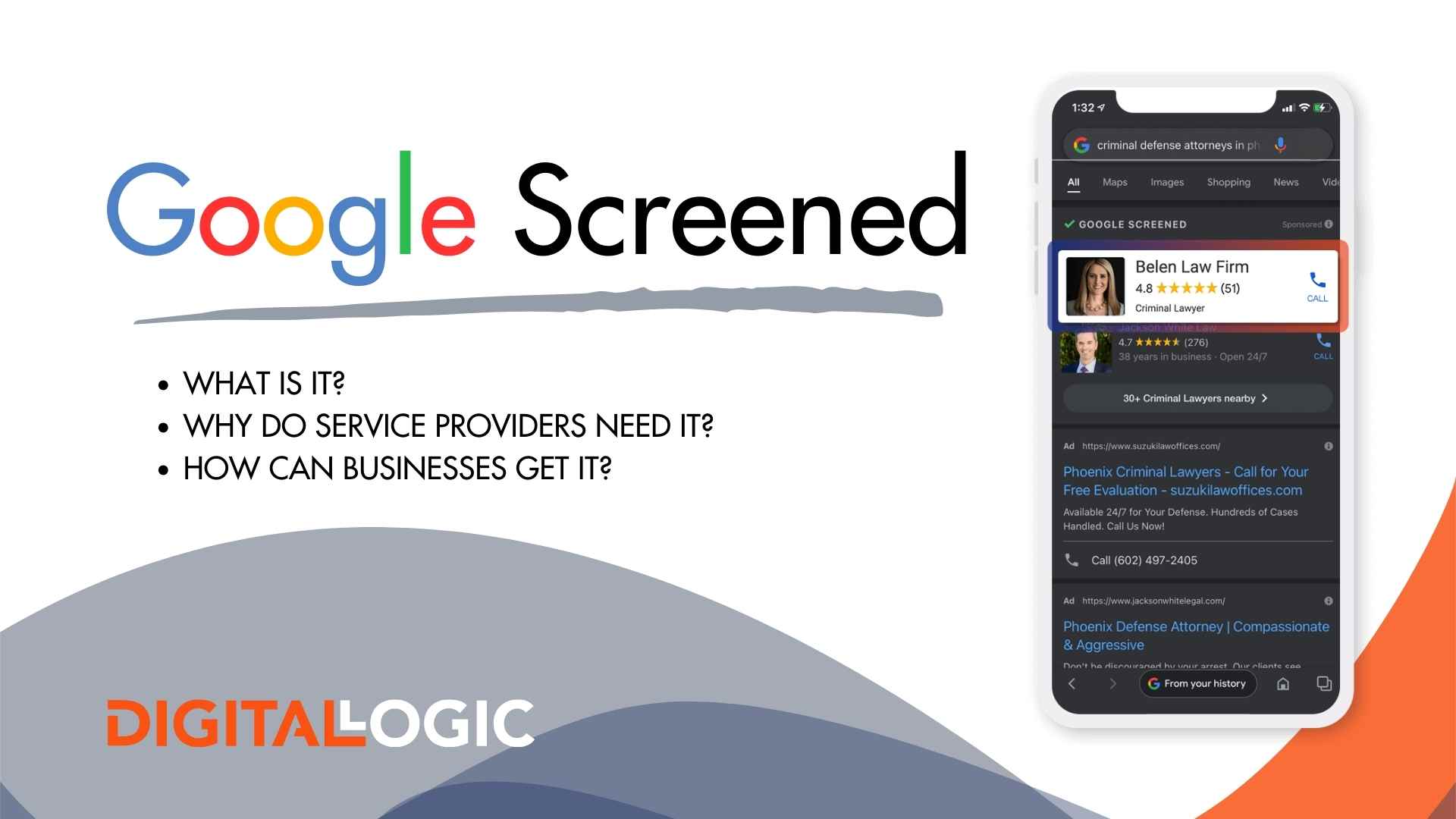Hospital marketing is a process of planned communication, awareness and relationship building designed to appeal to hospital consumers, lead them through their hospital journey, and keep them engaged with the hospital system.
Your hospital marketing strategy is to persuade potential hospital customers to choose your hospital. Then, guide those customers to do so, again and again. Next, your customers will work as marketing agents for you, as they recommend your hospital to their sphere of influence.
But, how do you grow and retain your patient base so that your hospital can thrive?
Patient-centered hospital marketing is integral to the growth of your hospital. Competition is steep for the healthcare and medical industry, across the board. Your patients are your customers. And, just like in any other industry, your potential customers have a variety of options.
So, why should they choose you?
Successful healthcare digital marketing services lead to successful patient engagement, which will lead to a growing hospital practice.


 Online content is anything online that represents your brand, organically. Content marketing is the practice of using content to draw traffic to your website. Content can be uploaded to your hospital’s website, social media or even YouTube channel. Content marketing materials can be as simple as photos, videos, FAQ pages, blog posts, new pages, etc.
When we explain the process of creating online content, typically the client’s instinct is to create purely promotional content. We understand. The goal is to promote your hospital, after all.
But, it’s important to remember that you’re also fostering a relationship of trust with your potential patients. You don’t foster a relationship by slamming marketing materials and electronic brochures down their throats. No, you do this by creating content that is helpful, educational, and engaging for them.
Online content is anything online that represents your brand, organically. Content marketing is the practice of using content to draw traffic to your website. Content can be uploaded to your hospital’s website, social media or even YouTube channel. Content marketing materials can be as simple as photos, videos, FAQ pages, blog posts, new pages, etc.
When we explain the process of creating online content, typically the client’s instinct is to create purely promotional content. We understand. The goal is to promote your hospital, after all.
But, it’s important to remember that you’re also fostering a relationship of trust with your potential patients. You don’t foster a relationship by slamming marketing materials and electronic brochures down their throats. No, you do this by creating content that is helpful, educational, and engaging for them.

 Back to our WebMD analogy. We know that every doctor has a horror story surrounding WebMD information. Consumers are turning to Google for medical advice more often than ever before. When they do, they’ll more than likely end up on WebMD. After all, WebMD gets almost 100 million visits a month just from Google traffic.
Here is a sample page on WebMD. This page gets almost 200,000 monthly visits for free just with “Chest Pain” related searches. What could your hospital do with 200,000 monthly hits?
Back to our WebMD analogy. We know that every doctor has a horror story surrounding WebMD information. Consumers are turning to Google for medical advice more often than ever before. When they do, they’ll more than likely end up on WebMD. After all, WebMD gets almost 100 million visits a month just from Google traffic.
Here is a sample page on WebMD. This page gets almost 200,000 monthly visits for free just with “Chest Pain” related searches. What could your hospital do with 200,000 monthly hits?
 You know that your hospital can’t compete with WebMD. This is true, at least on a national level.
You know that your hospital can’t compete with WebMD. This is true, at least on a national level.



 For your hospital’s search engine advertising campaign, it’s important to have a full set of conversion and ROI tracking setup for your campaign, including but not limited to:
For your hospital’s search engine advertising campaign, it’s important to have a full set of conversion and ROI tracking setup for your campaign, including but not limited to:
 Your potential patients search for information via a mobile device over half the time. Even if they didn’t, Google judges your website by its ability to be useful on mobile.
Google has an index that ranks search results based on the quality of its mobile interface. This is true even for searches that happen on desktops. If you have a fast, mobile-friendly website, you will rank higher in Google’s search results. Period.
But what does it mean to have a mobile-friendly website?
A mobile-friendly, or responsive website, is one that’s easy to view on screens and devices of all sizes. Your hospital’s website needs a design that will align text and images according to the screen the user is searching on.
Think about the last time you conducted a Google search on your phone. If you clicked on a site where the text was small and difficult to read, or the images didn’t align properly, you probably clicked off almost immediately. Your potential patients don’t want to spend time zooming in and out to read information about your hospital.
“If they don’t even care about their own website, how much will they care about me?” will be the thought process just before your potential patient clicks the “back button”.
Your potential patients search for information via a mobile device over half the time. Even if they didn’t, Google judges your website by its ability to be useful on mobile.
Google has an index that ranks search results based on the quality of its mobile interface. This is true even for searches that happen on desktops. If you have a fast, mobile-friendly website, you will rank higher in Google’s search results. Period.
But what does it mean to have a mobile-friendly website?
A mobile-friendly, or responsive website, is one that’s easy to view on screens and devices of all sizes. Your hospital’s website needs a design that will align text and images according to the screen the user is searching on.
Think about the last time you conducted a Google search on your phone. If you clicked on a site where the text was small and difficult to read, or the images didn’t align properly, you probably clicked off almost immediately. Your potential patients don’t want to spend time zooming in and out to read information about your hospital.
“If they don’t even care about their own website, how much will they care about me?” will be the thought process just before your potential patient clicks the “back button”.

Hospital Marketing Strategy
Table of Contents
Toggle
When Hospital Marketing Tactics Aren’t Healthy
If your hospital marketing is lacking or nonexistent, the entity won’t see an influx of new patients. Given the right set of circumstances, even your most loyal patients may fall prey to the marketing tactics of other hospitals in your area. You surely believe that patients should receive quality care from your staff at all times, right? Patient experience doesn’t start or end with personalized physician attention. Patients should receive quality care from every aspect of your hospital–from your social media to your website, to yes, you guessed it–your hospital marketing strategy. These pieces come together to create an overall customer or patient experience. When you market effectively while your staff treats patients carefully, your hospital will foster a relationship of trust with your patients.
What is Hospital SEO?
SEO is short for search engine optimization. So, the goal of hospital SEO services is to get your hospital’s online presence in the best position to rank for important terms on Google and other search engines. Your hospital will never find its way to the top of Google results for general search queries like “hospitals”, “orthopedics” or “general surgery”. Even if it did, these terms don’t show much, if any intent. However, local searches, such as “Dallas TX emergency room”, or “cardiologists near me” does. So, getting your hospital’s name at the top of the list for these queries is essential to online marketing for your business. Sound like a huge undertaking? It is. A good place to start is with hospital content marketing. Want to see how your current website is doing? Digital Logic offers a free SEO website audit service.Content Marketing for Hospitals
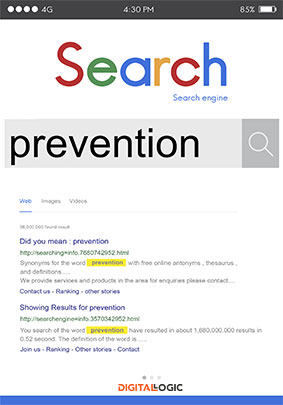 Online content is anything online that represents your brand, organically. Content marketing is the practice of using content to draw traffic to your website. Content can be uploaded to your hospital’s website, social media or even YouTube channel. Content marketing materials can be as simple as photos, videos, FAQ pages, blog posts, new pages, etc.
When we explain the process of creating online content, typically the client’s instinct is to create purely promotional content. We understand. The goal is to promote your hospital, after all.
But, it’s important to remember that you’re also fostering a relationship of trust with your potential patients. You don’t foster a relationship by slamming marketing materials and electronic brochures down their throats. No, you do this by creating content that is helpful, educational, and engaging for them.
Online content is anything online that represents your brand, organically. Content marketing is the practice of using content to draw traffic to your website. Content can be uploaded to your hospital’s website, social media or even YouTube channel. Content marketing materials can be as simple as photos, videos, FAQ pages, blog posts, new pages, etc.
When we explain the process of creating online content, typically the client’s instinct is to create purely promotional content. We understand. The goal is to promote your hospital, after all.
But, it’s important to remember that you’re also fostering a relationship of trust with your potential patients. You don’t foster a relationship by slamming marketing materials and electronic brochures down their throats. No, you do this by creating content that is helpful, educational, and engaging for them.

Professional Opinions Don’t Matter, Here
If you’re running a hospital, we will assume you have a pretty broad skill-set and wealth of knowledge to offer your hospital’s potential patients. This is great for impressing a Board but not necessarily what your potential clients will be looking for. Your knowledge will more than likely be well above your potential customers’ heads. Basically, your patients won’t ask the same questions you would ask. What will my potential patients ask? Those simple (and usually annoying) questions you answer seventeen times a day…Those questions that you can see coming before the person opens their mouth, just by the way they look…You know, the questions that, towards the end of the day, start making your blood boil. Those are the questions you’ll want to create content around. We can feel your excitement from here! If you’ve got a writer’s block, Google offers helpful information in the “People Also Ask” section. When you ask Google a question, it provides similar and popular questions. Effective content marketing takes time. Don’t expect a single blog post to double your website traffic overnight, even if it is a particularly good blog post. Your content will only convert as many patients as your website allows.Specific Medical Content
You wouldn’t need information about sinus infections if you thought you needed to see an orthopedic surgeon for a fracture, right? In the same way, you’ll want to break your content down into groups. It’s important to plan out content specifically for your hospital’s individual centers, based on specific search queries relevant to each center. When a patient comes “armed” with WebMD research, most physicians shutter. They think they know everything from 30 minutes of scanning the internet… We’ll let that marinate for a minute. Simply being in the healthcare industry is not enough to equip you for healthcare, medical or hospital marketing without lots of research.How to Get Free Organic Traffic for Your Hospital Website
 Back to our WebMD analogy. We know that every doctor has a horror story surrounding WebMD information. Consumers are turning to Google for medical advice more often than ever before. When they do, they’ll more than likely end up on WebMD. After all, WebMD gets almost 100 million visits a month just from Google traffic.
Here is a sample page on WebMD. This page gets almost 200,000 monthly visits for free just with “Chest Pain” related searches. What could your hospital do with 200,000 monthly hits?
Back to our WebMD analogy. We know that every doctor has a horror story surrounding WebMD information. Consumers are turning to Google for medical advice more often than ever before. When they do, they’ll more than likely end up on WebMD. After all, WebMD gets almost 100 million visits a month just from Google traffic.
Here is a sample page on WebMD. This page gets almost 200,000 monthly visits for free just with “Chest Pain” related searches. What could your hospital do with 200,000 monthly hits?
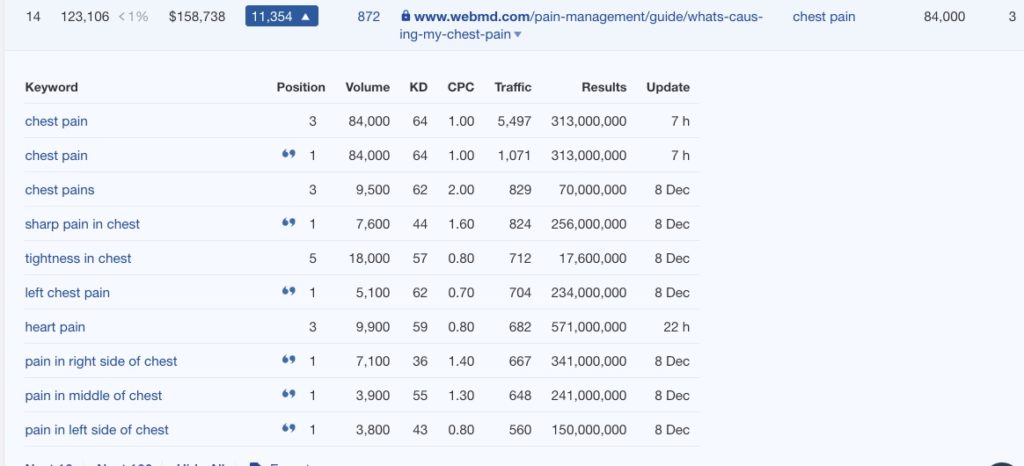 You know that your hospital can’t compete with WebMD. This is true, at least on a national level.
You know that your hospital can’t compete with WebMD. This is true, at least on a national level.
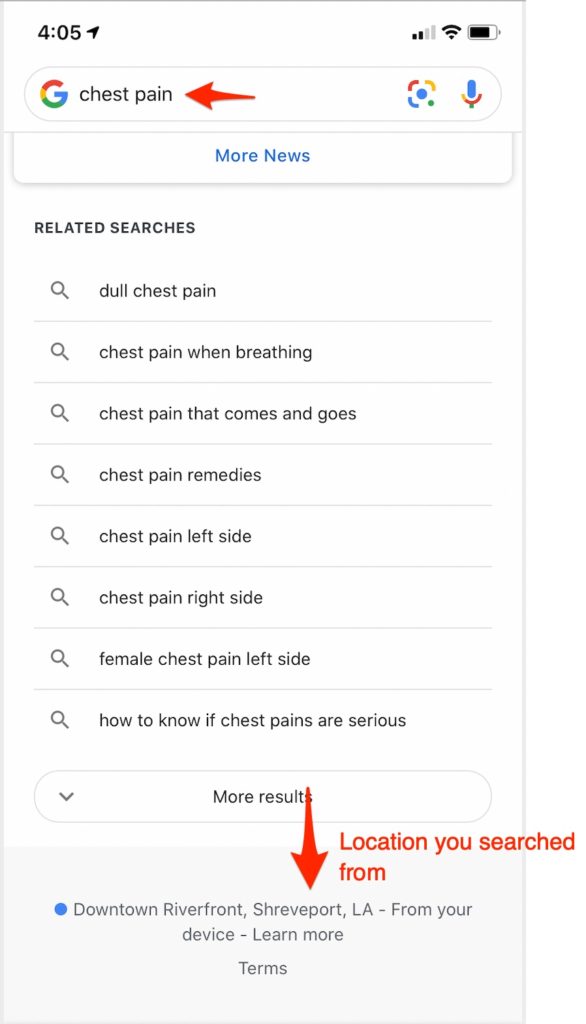
Use Content for Local Patients
But, if your hospital is located in Dallas, someone searching for medical information from California isn’t really your potential customer, anyways. And, Google understands this. Google will show pages on the internet based on where users are located. Someone Googling hospitals in California will not get the same results as someone Googling hospitals in Dallas. After a quick Google search, check out the bottom of the page. Google is pulling your location data. There is a wealth of knowledge available on Google. Thus, using location data helps those searching for local businesses find businesses in the correct area. This helps both the searcher and the local business. So, even if someone in California won’t see your blog post, someone in Dallas might.
How to Market Your Hospital Locally with Google My Business
A hospital with a complete Google My Business profile will have better results, locally, as opposed to a hospital that doesn’t. Google My Business is a platform that allows business owners to control their own Google listings. For starters, you should fill out as much information as you can about your hospital on Google My Business. Then, you’ll want to make monthly posts on Google My Business to show Google that your profile is current, and that you care about maintaining your online relationships with potential patients.Physician Google Business Listings
Each physician employed at your hospital needs their own Google business listing. Because, as you’re aware, patients don’t come for the hospital. They come for the physicians. So, when a potential patient Googles a specific physician, they will see a Google listing. Individual Google business listings will provide the searcher with all of the information they need to make an appointment. This is a win for the physician, and a win for your hospital.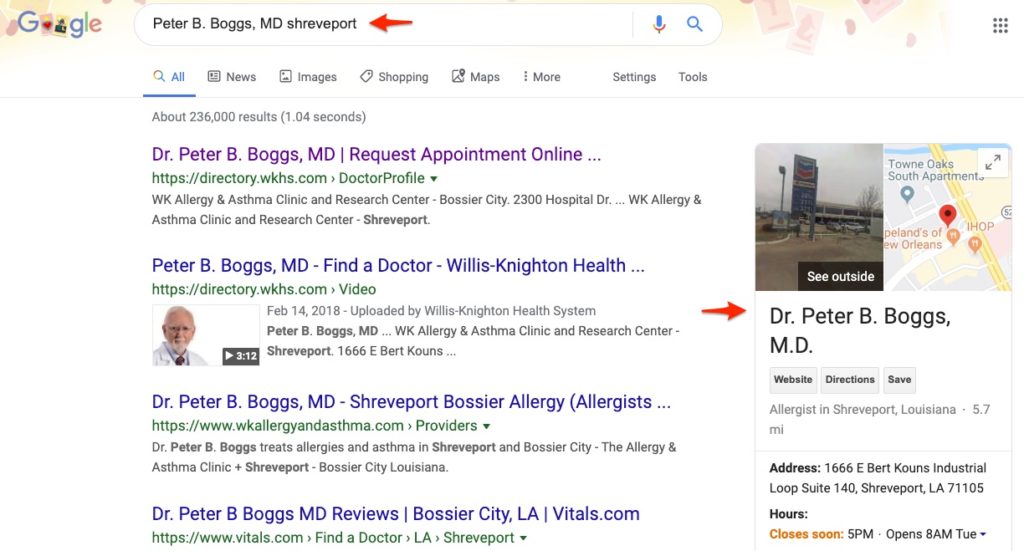
Social Media Marketing for Hospitals
Every business, including hospitals, should have a robust social media presence that supports all facets of your marketing strategy. The majority of your patients and potential patients spend a huge chunk of their time on sites like Facebook, Twitter, and LinkedIn. You don’t need to find your potential customers. You just need to meet them. Social media outlets are places where you can engage with them and build your brand. Take advantage of free outlets where you can connect with past and future patients by providing general healthcare advice, customer support, and creating brand awareness. These outlets may also help you discover partnerships. As a healthcare marketer, you’re aware that privacy is and always will be a legal concern. But, the majority of social media sites provide the benefits and data security necessary to use as an effective hospital marketing tool.Video Marketing
Video marketing should be an essential aspect of your overall hospital marketing plan. Why? For starters, YouTube is the world’s second-largest search engine, surpassed only by its parent company, Google. You also can’t count out the ever-popular videos on social media sites such as Facebook and Twitter. This needs no explanation. We know you indulge in these, too. Facebook reports daily video views in the billions. The data is clear, and so is the logic. Healthcare is a personable, patient-driven industry. Videos allow hospitals to showcase their staff and facilities in a palatable way, as well as share patient success stories. They show the image of the care experience in action. Video marketing can also mitigate the intimidation some patients may feel when faced with the prospect of visiting a hospital. Whether it’s a short, non-skippable ad on YouTube or full-length information and story-based videos for Facebook, every hospital can benefit from some form of video marketing.Search Engine Advertising for Hospitals (PPC)
If your hospital is not doing search engine advertising, also known as hospital PPC advertising, on Google, what are you doing? Running ads on Google ensures that the moment a potential customer searches for something relevant to your hospital, you can provide a listing to the appropriate page on your website. This is a sample search. Notice that when the user searched for cardiologists in Dallas, Baylor Hospital’s PPC ad showed them the most relevant page.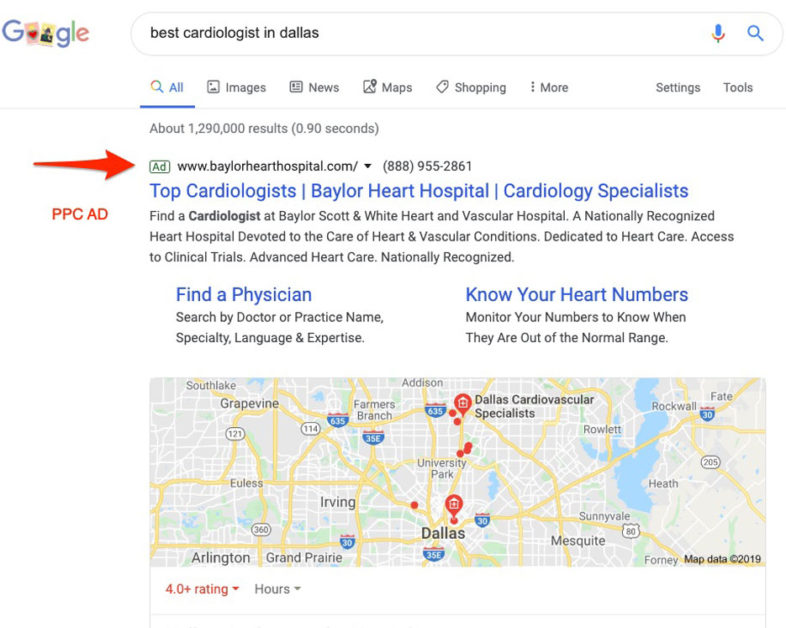 For your hospital’s search engine advertising campaign, it’s important to have a full set of conversion and ROI tracking setup for your campaign, including but not limited to:
For your hospital’s search engine advertising campaign, it’s important to have a full set of conversion and ROI tracking setup for your campaign, including but not limited to:
- Phone Calls From Ads
- Form Submissions
- Request appointment
- Cost Per Patient Acquisition
Safe SMS Marketing
With an open rate as high as 98%, including SMS as a part of your hospital marketing strategy is also lucrative. Confidentiality and integrity of customers’ data can be prone to security breaches. Opt for a safe, HIPPA-compliant texting platform to carry out bulk SMS campaigns to get the word out. Here’s a list of top sms marketing platforms with the highest safety features.Creating a Mobile-Friendly Hospital Website
You already know that your hospital’s website has to be up to par. If you know that it’s not, we recommend investing in professional hospital website design services. In 2023, your website must be mobile-friendly, as well. If you don’t have a mobile-friendly and responsive website, then you need to start there. Mobile-friendly websites are common for retail and other direct-to-consumer industries, but many hospitals have yet to build mobile-responsive websites. Your potential patients search for information via a mobile device over half the time. Even if they didn’t, Google judges your website by its ability to be useful on mobile.
Google has an index that ranks search results based on the quality of its mobile interface. This is true even for searches that happen on desktops. If you have a fast, mobile-friendly website, you will rank higher in Google’s search results. Period.
But what does it mean to have a mobile-friendly website?
A mobile-friendly, or responsive website, is one that’s easy to view on screens and devices of all sizes. Your hospital’s website needs a design that will align text and images according to the screen the user is searching on.
Think about the last time you conducted a Google search on your phone. If you clicked on a site where the text was small and difficult to read, or the images didn’t align properly, you probably clicked off almost immediately. Your potential patients don’t want to spend time zooming in and out to read information about your hospital.
“If they don’t even care about their own website, how much will they care about me?” will be the thought process just before your potential patient clicks the “back button”.
Your potential patients search for information via a mobile device over half the time. Even if they didn’t, Google judges your website by its ability to be useful on mobile.
Google has an index that ranks search results based on the quality of its mobile interface. This is true even for searches that happen on desktops. If you have a fast, mobile-friendly website, you will rank higher in Google’s search results. Period.
But what does it mean to have a mobile-friendly website?
A mobile-friendly, or responsive website, is one that’s easy to view on screens and devices of all sizes. Your hospital’s website needs a design that will align text and images according to the screen the user is searching on.
Think about the last time you conducted a Google search on your phone. If you clicked on a site where the text was small and difficult to read, or the images didn’t align properly, you probably clicked off almost immediately. Your potential patients don’t want to spend time zooming in and out to read information about your hospital.
“If they don’t even care about their own website, how much will they care about me?” will be the thought process just before your potential patient clicks the “back button”.

